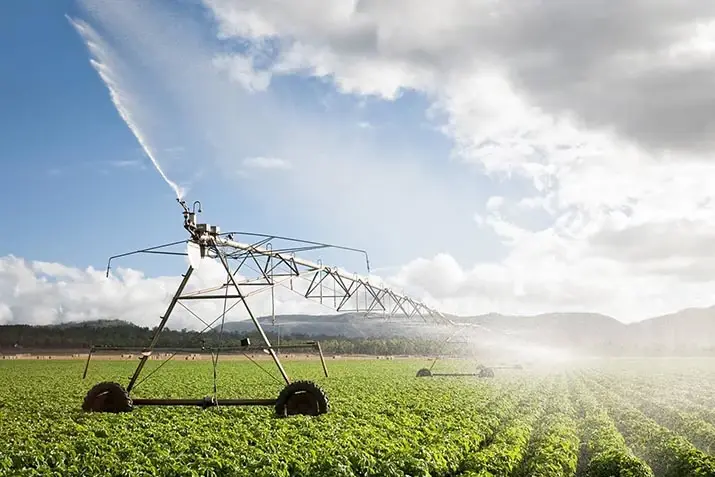Sustainability
Sustainably Simplot: Reducing Our Water Consumption in a Thirsty World
24/1/2020

We tend to take fresh water for granted in the U.S.; just turn on the faucet and out it flows. The supply is so reliable that we forget just how crucial fresh water is to our existence: to drink, to grow food, to make products.
But as the world population grows, so does the pressure on our freshwater resources. Already 844 million people worldwide (about 1 in 10) lack basic access to drinking water, according to World Vision.1 Climate change is expected to exacerbate this crisis.
At Simplot Foods, our mission is to feed the world by bringing Earth’s resources to life. The fact that agriculture accounts for about 80% of total U.S. water consumption (90% in western states) places a large share of responsibility for ensuring future water availability squarely on food producers like us.2
Fortunately, as a vertically integrated agribusiness with a hand in nearly every stage of food production, we’re in a special position to make meaningful improvements up and down the food production process. And we have.
Encouraging more efficient irrigation by growers
Intelligent application of irrigation has become an ever-increasing concern. Simplot’s SmartWater™ technology uses sophisticated sensors and monitoring equipment that gives growers the insights to deliver the water required for optimal growth, precisely when and where it’s needed.
- The SmartWaterSM system reduces poor drainage, excess runoff, leaching, and compaction while improving root activity and overall crop yields.
- SmartWaterSM is a variable-rate irrigation system that analyzes the specific needs of crops throughout the growing cycle.
- Combines on-site sensors, image mapping, and analytic software.
- Our SmartWaterSM growers achieve a reduction of 2 to 3 inches of application per season, plus yield increases of 3% to 5%.3
Building new processing facilities and upgrading older ones
In 2014, Simplot completed the construction of North America’s most efficient potato processing plant in Caldwell, Idaho. Water efficiency was a priority in its design and it shows in the results.
- The new plant uses 46% less water than the plant it replaced
- Treats 2.3 million gallons per day of potato processing wastewater
- Has a water system that can recover up to 75% of wastewater for reuse. Remaining effluent is used to irrigate forage crops adjacent to the plant
- Was recognized as the 2016 Industrial Project of the Year, WateReuse Association.
The new Caldwell plant also reduced CO2 emissions by 20% compared to the previous facility. In 2017, it was recognized the Green Plant of the Year by Food Processing magazine.
Developing new, more sustainable varieties of potatoes
Different plant species have different requirements for water and nutrients. The same holds true for different varieties of potatoes. Simplot plant scientists are developing and introducing new, more efficient varieties for growers.
- Simplot’s Innate™ variety of white potatoes (fresh market only) reduces bruising, browning and susceptibility to Late Blight by adapting potato genes from existing wild and cultivated varieties. This translates to more useable potatoes and less waste in each crop, raising total water efficiency while reducing the need for pesticide applications.
- Other varieties use up to 40% less nitrogen to produce the same total crop.
Supporting wider industry sustainability efforts
While we’ve made sustainability a focus within Simplot, we’re also supporting the broader movement beyond our doors. We’re actively involved in industry-wide efforts to increase the sustainability of growing and processing food.
- In 2012, Simplot co-founded the Potato Sustainability Initiative (PSI), a partnership of growers, grower organizations, processors, potato product buyers, the National Potato Council, the Canadian Horticultural Council and the IPM Institute of North America, working to improve the sustainability of potato production. PSI has grown more than 500 growers, six processors and two major potato buyers.
- Simplot is also a member of Field to Market: The Alliance for Sustainable Agriculture. It brings together a diverse group of grower organizations; agribusinesses; food, beverage, restaurant and retail companies; conservation groups; universities and public sector partners to focus on defining, measuring and advancing the sustainability of food, fiber and fuel production. Field to Market is comprised of more than 140 members representing all facets of the U.S. agricultural supply chain, with members employing more than 5 million people and representing combined revenues totaling over $1.5 trillion.
A long history of waste not, want not
When our founder Jack Simplot was growing up, farming on the arid Snake River Plain of south-central Idaho in the early 1900’s, sustainability wasn’t a word he would have recognized; it was simply how you survived in such an austere environment. Little was wasted. What could be reused or repurposed was. He would go on to imbue our company with these same values.
Today, as critical resources like fresh water face ever-increasing demand, you can count on Simplot to continue making our plants, processes and products more sustainable, drop by drop, year after year.
- https://www.worldvision.org/clean-water-news-stories/global-water-crisis-facts
- https://www.ers.usda.gov/topics/farm-practices-management/irrigation-water-use/
- Global irrigation statistic from University of Minnesota, Environment Reports, http://www.environmentreports.com/can-eat-less-water/
